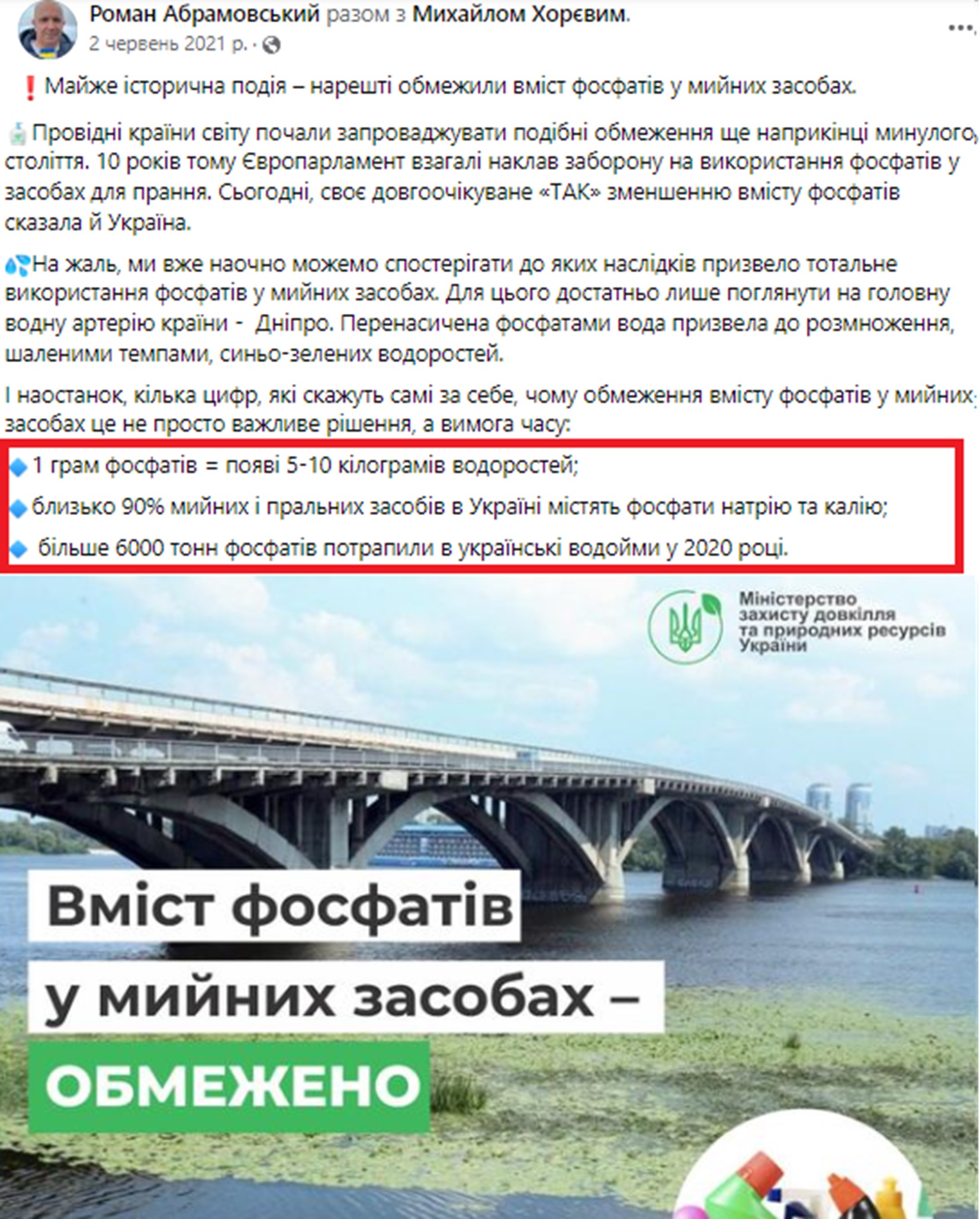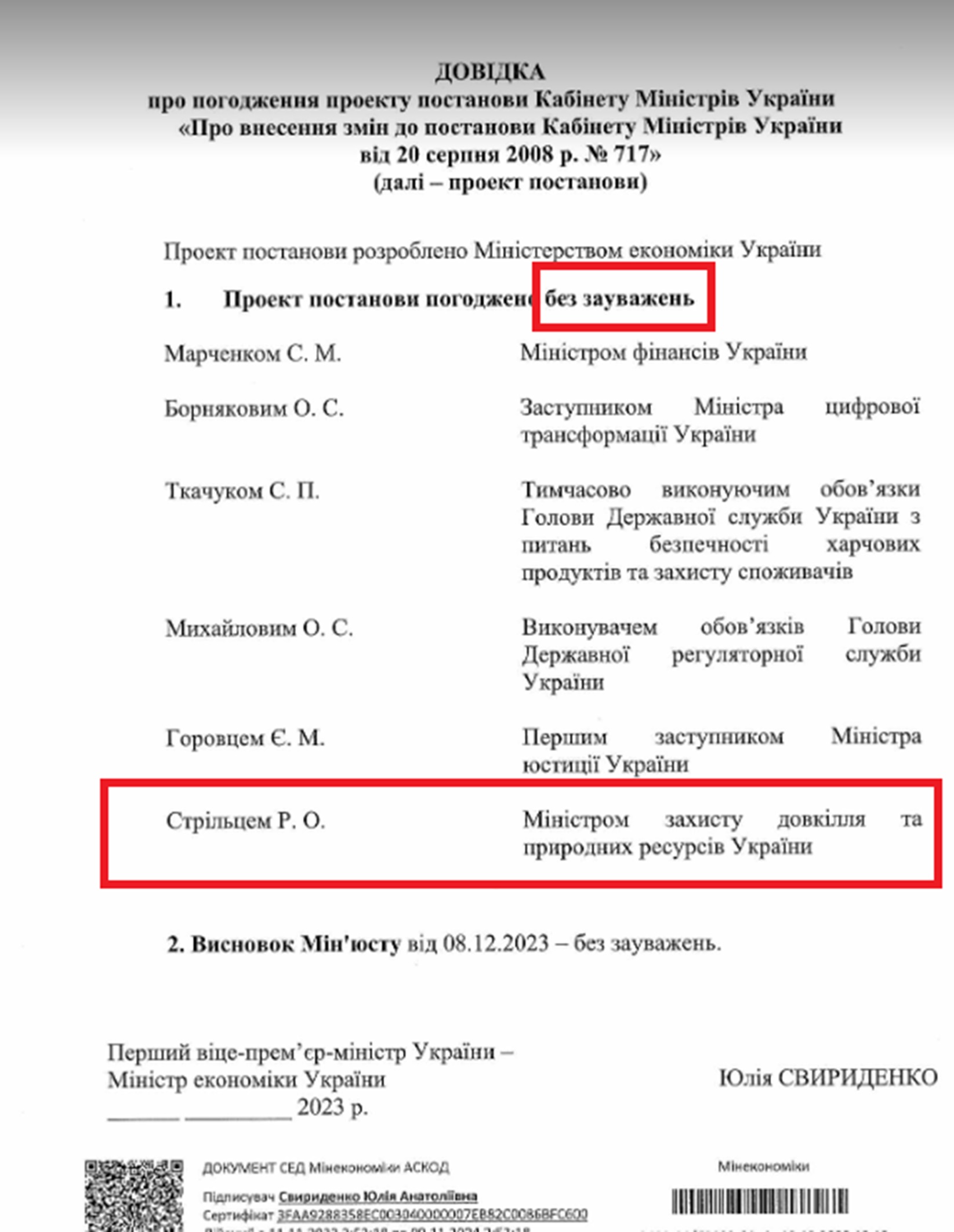Комитет министров отложил введение ограничений на использование фосфатов в составе моющих средств.
С 1 января 2024 года должен был бы вступить в действие правительственный поэтапный запрет на использование фосфатов как в бытовой, так и в промышленной химии. Кабмин поддержал соответствующий документ еще два года назад — перед началом полномасштабной войны. Тогдашний министр экологии Роман Абрамовский подчеркнул: это историческое решение. По сути, наш технический регламент с того момента начал соответствовать требованиям ЕС.
Европарламент наложил запрет использовать фосфаты в средствах для стирки еще более 10 лет назад. А некоторые прогрессивные страны начали это делать еще в конце прошлого века.
Но 22 декабря этого года правительство отсрочило действие этой нормы. Это произошло после того, как Европейский Совет одобрил переговоры о вступлении в ЕС. Теперь экологически важная инициатива заработает… после победы. Да и то не сразу, а через 90 дней после завершения военного положения. Но тот, кто уже производит моющие средства с фосфатами — их эти ограничения не будут касаться даже после победы.
Как фосфаты вредят здоровью?
Фосфаты вредят нашим водоемам и вызывают такое явление как цветение воды — размножение сине-зеленых водорослей. Если их слишком много, на пляжах могут ввести запрет для купания, потому что они негативно влияют на здоровье людей: раздражение кожи, зуд, отек слизистой глаз и носа, повышение температуры, боль в мышцах и суставах. Могут вызвать даже тошноту или рвоту. Особенно уязвимы к этому дети и пожилые люди.
От этого страдают все водоемы. Когда правительство принимало решение, то министр экологии отметил, что за год в водоемы попало более 6 тыс. тонн фосфатов. Страдает и Днепр, из которого 70% населения потребляет воду.

Руководительница Ассоциации профессионалов окружающей среды PAEW Людмила Цыганок после отсрочки поэтапного запрета фосфатов, отметила, что именно они могут влиять на водоснабжение целых городов:
«Это катастрофически даже в мирное время… А что говорить о настоящем? Несколько лет назад в двадцатитысячном городе Корсунь-Шевченковский было прекращено водоснабжение из реки Рось. И в качестве питьевой использовалась привозная вода! Это повлекло за собой огромные расходы, потому что Стеблевское водохранилище было полностью загрязнено. То есть, город стоит на реке, а водой из нее пользоваться нельзя».
Какие министерства поддержали использование вредной бытовой и промышленной химии?
Документ, который удалось получить от правительства свидетельствует, что Минприроды согласовало проект правительственного постановления, который отсрочил ограничения фосфатов в моющих средствах.

«Это не была инициатива Минприроды. То, что я знаю, Минэкономики видит для этого какие-то предпосылки. Мне очень хотелось бы, чтобы Минприроды играло не последнюю скрипку в этом оркестре», — говорит нардеп Олег Бондаренко («Слуга народа»), который возглавляет экологический комитет Верховной Рады.
В Минэкономики объясняют, что отсрочка была нужна именно из-за условий, которые возникли во время войны.
«Есть техрегламнент, который определяет нормы. Крупные предприятия должны были бы перейти на новые стандарты — изменить технологии. Началась война и к нам обратились ассоциации, Американская торговая палата. Предприятия не могут делать инвестиции и попросили отложить этот вопрос до конца военного положения. Вопрос здесь исключительно в экономической плоскости», — говорит заместитель министра экономики Виталий Киндратив.
Химическая промышленность год назад информировала, что объем оборотных средств уменьшились $5-6 млрд из-за войны. Доля химической промышленности в ВВП Украины составляет около 3%. В структуре промышленного производства эта отрасль, в зависимости от года, занимала от 9% до 10. При этом, объем внутреннего товарного рынка химической продукции в Украине по итогам 2020 года составил $10,6 млрд, из них импорт — 74%, собственное производство — 26%.
Пока ответы на вопрос о том, как после победы предприятия за 90 дней успеют модернизировать свои мощности? И что делать, если война затянется еще на несколько лет нет.
Но здесь важно понимать, что теперь в тексте правительственного постановления говорится вот о чем: «Установить, что предоставление на рынке моющих средств (Предоставление продукции на рынке — это любая платная или бесплатная поставка продукции для ее распространения, потребления на рынке Украины при осуществлении хозяйственной деятельности — прим. авт. ), которые были введены в обращение до даты применения ограничений по содержанию фосфатов и других соединений фосфора в моющих средствах, установленных в приложении 1 к Техническому регламенту, утвержденному этим постановлением, не может быть запрещено или ограничено по причинам несоответствия таких моющих средств установленным ограничениям».
Таким образом те, кто уже вышли на рынок — никому ничего не будут должны и не должны ничего менять.
В Миндовкилле говорят, что при проработке изменений в техрегламент они давали свои оговорки и планируют еще вносить изменения в это постановление, которые касаются именно приведенного выше абзаца:
«Здесь действительно надо еще уточнить, что речь идет о товарах, которые на момент завершения войны будут в обращении у нас в стране. Кроме того, надо будет наработать совместно с Минэкономики решение по урегулированию указанного вопроса для сохранения наших водных ресурсов в соответствии с проектами Планов управления речными бассейнами, которые содержат меры по экологическому оздоровлению и послевоенному восстановлению водоемов. Среди которых модернизация устаревших очистных сооружений и канализационных сетей, что позволит значительно улучшить очистку сточных вод и соответственно обезопасить водоемы от попадания в них такого количества фосфатов. Требования Техрегламента Украины по экологической маркировке, которые вступят в силу после завершения военного положения, являются более жесткими чем нормы, установленные директивами ЕС. К примеру ЕС устанавливает нормы фосфатов в моющих средствах на уровне 0,5 граммов, зато у нас на уровне 0,2 грамма», — отмечает первый заместитель Министра окружающей среды Александр Краснолуцкий.
Что касается регламента ЕС, то там ситуация с законодательством такова, что каждая страна может установить более жесткие нормы. Когда принимали решение об ограничении фосфатов в бытовой и промышленной химии в 2021 году, то понимали, что наши очистные сооружения не способны очистить воду с фосфатами и поэтому, экологи, и водоканалы просили установить более жесткие нормы. Что и было сделано, а теперь отменено.
Михаил Хорев, который сейчас преподает в Киево-Могилянской Академии, а ранее был заместителем Министра экологии, отмечает, что в ЕС давно используют бесфосфатные моющие средства на основе цеолитов и сополимеров:
«Но ученые установили, что и они негативно влияют на окружающую среду и здоровье людей. Правительства стран ЕС поставили задачу разработать новое поколение более безопасных моющих средств. Действует специальная программы РЕАСН, которая мониторит вредность такого воздействия и определяет жесткие предельные нормы. Конечно, химическая индустрия не в восторге. Но пришли к выводу, что отрасль химической промышленности обязана продолжать исследования по созданию более безопасной бытовой химии. Комиссия ЕС предупреждает химический бизнес о введении в будущем более жестких гигиенических и экологических ограничений. А в это время мы пролонгируем использование фосфатов».
Напомним, это не единственная инициатива правительства, которую критикуют экологи. Кабмин своим постановлением учредил «Леса Украины», которое впоследствии должно стать акционерным. Экологи видят в этом серьезную угрозу для сохранения лесного фонда государства. Значительную часть лесов удалось бы также защитить, если бы Украина выполнила одно из своих евроинтеграционных обязательств и создала изумрудную сеть особо ценных территорий, чтобы охранять редкие виды растений и животных. Но Верховная Рада уже несколько лет не может рассмотреть соответствующий законопроект (4461).


